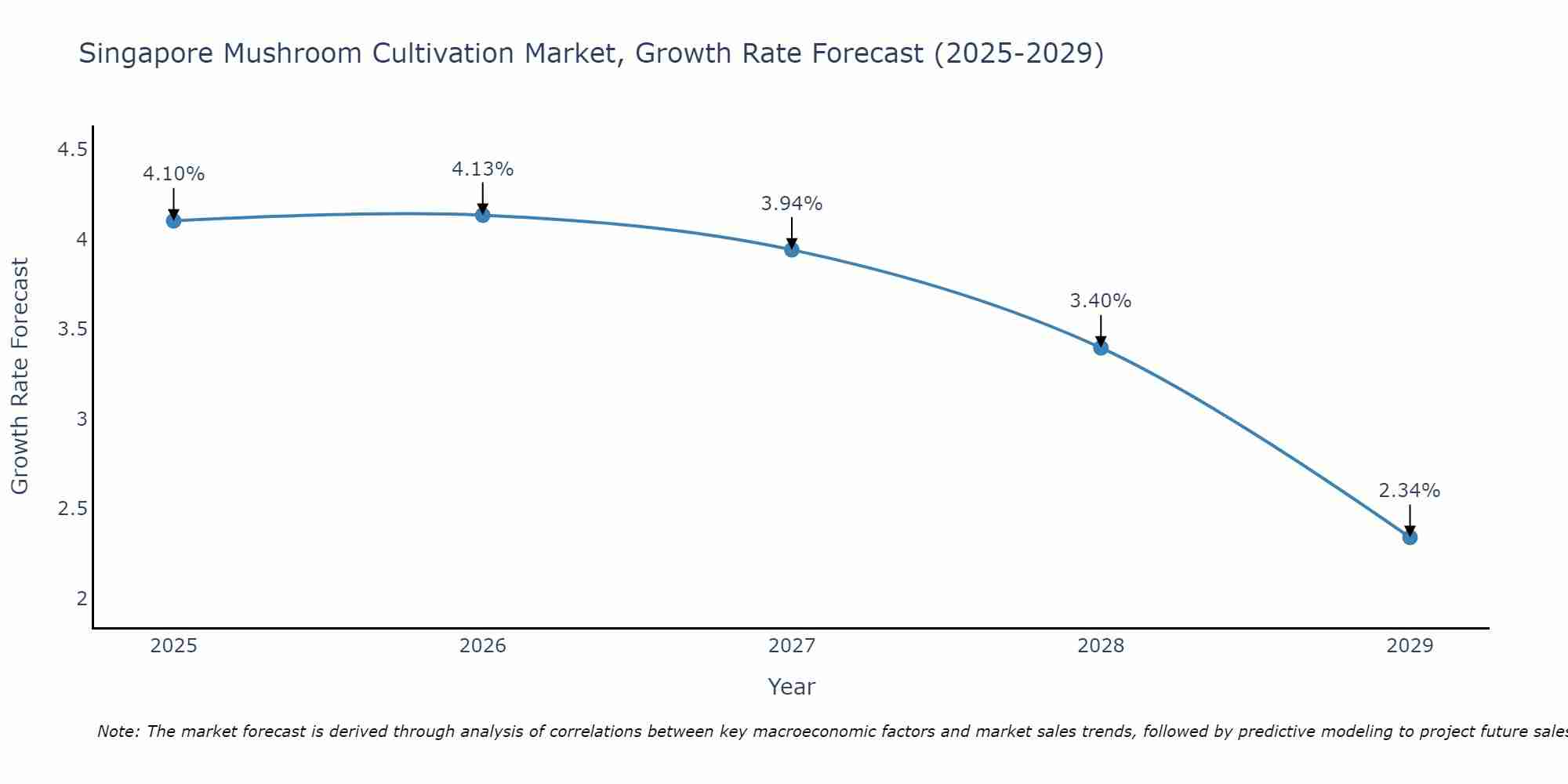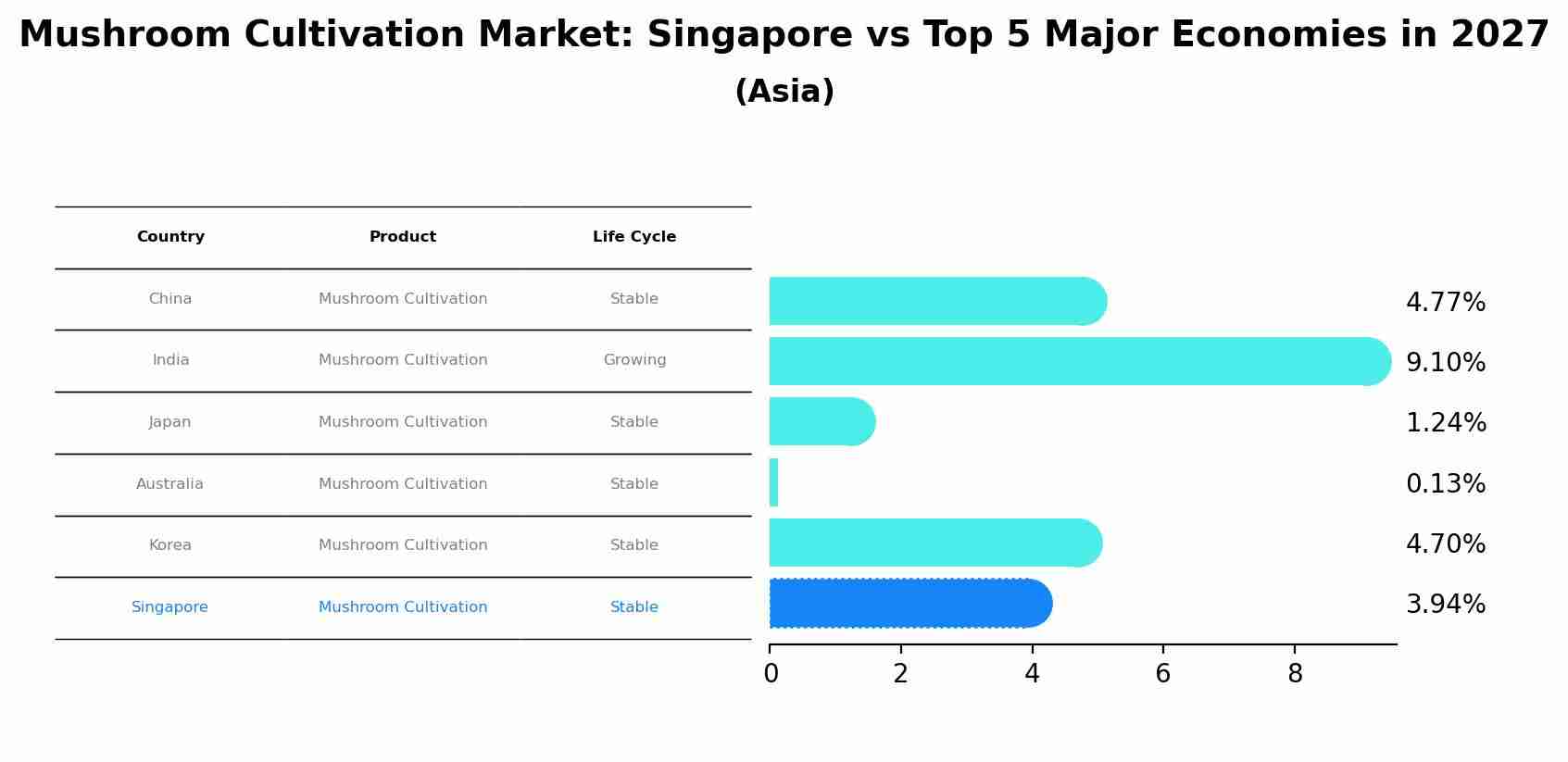Singapore Mushroom Cultivation Market (2025-2031) Outlook | Size, Share, Industry, Value, Trends, Analysis, Growth, Forecast, Companies & Revenue
| Product Code: ETC383127 | Publication Date: Aug 2022 | Updated Date: Apr 2025 | Product Type: Market Research Report | |
| Publisher: 6Wresearch | Author: Ravi Bhandari | No. of Pages: 75 | No. of Figures: 35 | No. of Tables: 20 |
Singapore Mushroom Cultivation Market Size Growth Rate
The Singapore Mushroom Cultivation Market is projected to witness mixed growth rate patterns during 2025 to 2029. Starting at 4.10% in 2025, the market peaks at 4.13% in 2026, and settles at 2.34% by 2029.

Mushroom Cultivation Market: Singapore vs Top 5 Major Economies in 2027 (Asia)
By 2027, the Mushroom Cultivation market in Singapore is anticipated to reach a growth rate of 3.94%, as part of an increasingly competitive Asia region, where China remains at the forefront, supported by India, Japan, Australia and South Korea, driving innovations and market adoption across sectors.

Singapore Mushroom Cultivation Market Synopsis
The mushroom cultivation market in Singapore plays a role in supplying fresh mushrooms to consumers and the foodservice industry. Mushroom cultivation can be carried out through indoor farming methods and controlled environments. The market`s growth is influenced by the demand for locally grown and sustainable mushroom products, as well as the culinary versatility of mushrooms.
Drivers of the Market
The growth of the Singapore mushroom cultivation market is influenced by factors such as agricultural practices, culinary preferences, and sustainability. Mushroom cultivation involves the production of various mushroom varieties. Growth drivers include the demand for exotic and health-conscious mushroom varieties, innovations in cultivation techniques for yield and quality, and applications in local agriculture, gourmet cuisines, and health food products. As consumers seek fresh and nutrient-rich mushrooms, the mushroom cultivation market is expected to grow, providing essential ingredients for culinary and dietary needs.
Challenges of the Market
The mushroom cultivation market in Singapore confronts challenges associated with agricultural practices and resource optimization. Maximizing mushroom yields while minimizing environmental impact, water usage, and energy consumption in cultivation remains a significant challenge. Implementing advanced technologies and efficient cultivation methods is essential for sustainable mushroom farming.
COVID-19 Impact on the Market
The mushroom cultivation market in Singapore navigated the COVID-19 pandemic with adaptability. While there were fluctuations in some supply chains, mushroom cultivation continued to be an important agricultural activity. Growers adapted by implementing sustainable and controlled environment practices. The pandemic emphasized the significance of locally sourced and nutritious food, influencing market strategies.
Key Players in the Market
Mushroom cultivation in Singapore is experiencing growth, with companies like Kin Yan Agrotech and Kinoko Farm at the forefront. The market is influenced by the increasing demand for fresh, locally grown mushrooms and the adoption of sustainable farming practices.
Key Highlights of the Report:
- Singapore Mushroom Cultivation Market Outlook
- Market Size of Singapore Mushroom Cultivation Market, 2024
- Forecast of Singapore Mushroom Cultivation Market, 2031
- Historical Data and Forecast of Singapore Mushroom Cultivation Revenues & Volume for the Period 2021-2031
- Singapore Mushroom Cultivation Market Trend Evolution
- Singapore Mushroom Cultivation Market Drivers and Challenges
- Singapore Mushroom Cultivation Price Trends
- Singapore Mushroom Cultivation Porter's Five Forces
- Singapore Mushroom Cultivation Industry Life Cycle
- Historical Data and Forecast of Singapore Mushroom Cultivation Market Revenues & Volume By Type for the Period 2021-2031
- Historical Data and Forecast of Singapore Mushroom Cultivation Market Revenues & Volume By Button Mushroom for the Period 2021-2031
- Historical Data and Forecast of Singapore Mushroom Cultivation Market Revenues & Volume By Oyster Mushroom for the Period 2021-2031
- Historical Data and Forecast of Singapore Mushroom Cultivation Market Revenues & Volume By Shiitake Mushroom for the Period 2021-2031
- Historical Data and Forecast of Singapore Mushroom Cultivation Market Revenues & Volume By Others for the Period 2021-2031
- Singapore Mushroom Cultivation Import Export Trade Statistics
- Market Opportunity Assessment By Type
- Singapore Mushroom Cultivation Top Companies Market Share
- Singapore Mushroom Cultivation Competitive Benchmarking By Technical and Operational Parameters
- Singapore Mushroom Cultivation Company Profiles
- Singapore Mushroom Cultivation Key Strategic Recommendations
Frequently Asked Questions About the Market Study (FAQs):
- Single User License$ 1,995
- Department License$ 2,400
- Site License$ 3,120
- Global License$ 3,795
Search
Thought Leadership and Analyst Meet
Our Clients
Related Reports
- Afghanistan Apparel Market (2026-2032) | Growth, Outlook, Industry, Segmentation, Forecast, Size, Companies, Trends, Value, Share, Analysis & Revenue
- Canada Oil and Gas Market (2026-2032) | Share, Segmentation, Value, Industry, Trends, Forecast, Analysis, Size & Revenue, Growth, Competitive Landscape, Outlook, Companies
- Germany Breakfast Food Market (2026-2032) | Industry, Share, Growth, Size, Companies, Value, Analysis, Revenue, Trends, Forecast & Outlook
- Australia Briquette Market (2025-2031) | Growth, Size, Revenue, Forecast, Analysis, Trends, Value, Share, Industry & Companies
- Vietnam System Integrator Market (2025-2031) | Size, Companies, Analysis, Industry, Value, Forecast, Growth, Trends, Revenue & Share
- ASEAN and Thailand Brain Health Supplements Market (2025-2031) | Strategy, Consumer Insights, Analysis, Investment Trends, Opportunities, Growth, Size, Share, Industry, Revenue, Segments, Value, Segmentation, Supply, Forecast, Restraints, Outlook, Competition, Drivers, Trends, Demand, Pricing Analysis, Competitive, Strategic Insights, Companies, Challenges
- ASEAN Bearings Market (2025-2031) | Strategy, Consumer Insights, Analysis, Investment Trends, Opportunities, Growth, Size, Share, Industry, Revenue, Segments, Value, Segmentation, Supply, Forecast, Restraints, Outlook, Competition, Drivers, Trends, Demand, Pricing Analysis, Competitive, Strategic Insights, Companies, Challenges
- Europe Flooring Market (2025-2031) | Outlook, Share, Industry, Trends, Forecast, Companies, Revenue, Size, Analysis, Growth & Value
- Saudi Arabia Manlift Market (2025-2031) | Outlook, Size, Growth, Trends, Companies, Industry, Revenue, Value, Share, Forecast & Analysis
- Uganda Excavator, Crane, and Wheel Loaders Market (2025-2031) | Strategy, Consumer Insights, Analysis, Investment Trends, Opportunities, Growth, Size, Share, Industry, Revenue, Segments, Value, Segmentation, Supply, Forecast, Restraints, Outlook, Competition, Drivers, Trends, Demand, Pricing Analysis, Competitive, Strategic Insights, Companies, Challenges
Industry Events and Analyst Meet
Whitepaper
- Middle East & Africa Commercial Security Market Click here to view more.
- Middle East & Africa Fire Safety Systems & Equipment Market Click here to view more.
- GCC Drone Market Click here to view more.
- Middle East Lighting Fixture Market Click here to view more.
- GCC Physical & Perimeter Security Market Click here to view more.
6WResearch In News
- Doha a strategic location for EV manufacturing hub: IPA Qatar
- Demand for luxury TVs surging in the GCC, says Samsung
- Empowering Growth: The Thriving Journey of Bangladesh’s Cable Industry
- Demand for luxury TVs surging in the GCC, says Samsung
- Video call with a traditional healer? Once unthinkable, it’s now common in South Africa
- Intelligent Buildings To Smooth GCC’s Path To Net Zero


















